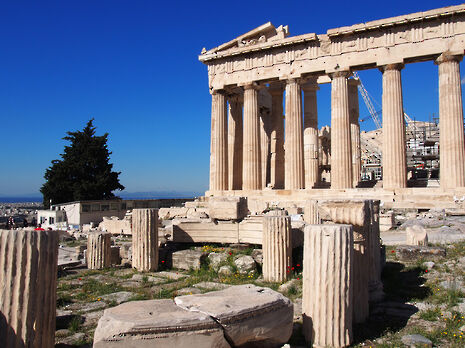In search of the authentic: taking tragedy home
Francesca Picciano Moss explores her experience at the Festival of Ancient Drama in Athens

‘Oh house, once you were happy, but how I lament for you now’. So says the Messenger in a moment of haunting calm, as Euripides’ Bacchae reaches its tragic denouement. The Bacchae is an eerie play. It is punctured by moments of frenzy and moments of perfect stillness, and it is neither of these alone, but the two together, that have a profoundly jarring and ‘tragic’ effect. But what sort of performance of the Bacchae—or any Greek tragedy—is the most ‘tragic’, the most ‘right’? What style should they be performed in, and where should they be performed? These are difficult questions to answer.
A recent production of the Bacchae, in which I was a member of the cast, claimed to be a stark ‘examination of the human condition, asking questions such as: who are we?’ When we performed in a proscenium arch theatre in London, we thought we knew who we were. Everything fitted together nicely: lights flashed red, atmospheric music trickled threateningly from the speakers, and the smoke machine produced a Bacchic mist that swallowed up the actors. But when we took it to Greece and staged the same frenzy and stillness on the millennia-old slabs of an ancient open-air theatre, under the bright, warm sun, and with a backdrop of the verdant Peloponnese, everything simultaneously fell apart, and was put back together to create a performance that no one—least of all the cast—had been expecting.
Our performance was part of an Ancient Drama Festival, which took the form of a Festival to Dionysus, just as it would have been watched, on that very same spot, by the inhabitants of Ancient Messene. The festival was opened by a masked woman chanting at length in Ancient Greek, whilst feeding a flame with incense. There was not a smoke machine in sight, but the effect was more profound than any of us could have imagined. Despite most of us not understanding the chanting, we were completely transfixed by this woman, who seemed to be standing outside of time entirely. She was mysterious and strangely menacing, but the bright sun and beautiful day was, from our Bloomsbury Theatre point of view, unfitting. Being an audience in broad daylight was a startlingly Brechtian experience, as we could see the spectators in front of us on the tiered seats, and were never allowed to forget that we were watching theatre. The ancient open-air theatre was remarkably well-preserved, but was still the ruins of something that had once been complete. What we were seeing was the remnants of the original space. The verfremdungseffekt this created rendered the whole experience all the more strange and puzzling: we were watching something very ‘then’, and something very ‘now’ too.
Also there to perform in the Festival were acting students from RADA, our neighbours in Bloomsbury. Their interpretation of Aeschylus’ Eumenides was truly spectacular: it involved song, physical theatre and incredible ensemble sections. Their simple use of different brightly coloured scarves—which stood out against their black vests and shorts, and made for an aesthetically beautiful performance—to differentiate between the characters, was very effective. Apollo was played by two young men, one on the other’s shoulders, who moved like a god and spoke like one too. Pallas Athena was played by not one actor but two: a man and a woman, who used ballet-like movements to create a sense of balance that superbly conveyed her character, and her charge of effecting justice. All of us commented afterwards that the performance was ‘very RADA’. But Aeschylus did not write the Eumenides to be performed on RADA’s MA Acting course. So why did it work?
The performances—the opening ceremony, the Eumenides and the Bacchae—worked precisely because what we were doing was ‘strange’. We were actors performing in 2015, we used physical theatre, and we were performing in translation. We were performing atmospheric music on contemporary instruments that we have been led to believe is authentic by our tradition of Troy and Gladiator-style Hans Zimmer film scores, but that is probably nothing like the original music. But we were doing it all on the very spot that it was performed 2,500 years ago.
Why should we look for an authentic performance of a Greek tragedy? It is initially tempting to look for authenticity. Perhaps with a dated, closed text that has not stood the test of time, we have to perform it in the original style in order for it to ‘make sense’. But tragedy ‘makes sense’ however it is performed. Surely, if the themes of tragedy transcend time, if they cross the threshold from ancient to modern—and that is definitely why a large part of the Bacchae cast study Classics—a tragedy should be performed in the style of any time. It is not in a desperate attempt to justify my Classics degree that I say that the stuff of tragedy is the stuff of life. Tragedy is everyone’s business: in a rehearsal studio at LAMDA, the acting students are part of a cultural heritage, a tradition that is ongoing.
The Bacchae is a play about madness and unfixed identities. It is intense, but intensely unstable. Pentheus is seen as a man and a woman. Dionysus appears as a human and a god. The Bacchae are transformed from tame women working at the loom, to mad creatures thirsty for Pentheus’ blood. Having seen—and experienced performing in—the Ancient Drama Festival, I would urge any director or performer of Greek tragedy to embrace the hybridity and uncertainties of the genre. We should embrace the old and the new, embrace Bloomsbury and embrace Ancient Messene. Because the very fact that we are performing Euripides and Aeschylus forces us to ask the question: when it comes to tragedy, what is authenticity?
 Comment / Plastic pubs: the problem with Cambridge alehouses 5 January 2026
Comment / Plastic pubs: the problem with Cambridge alehouses 5 January 2026 News / News in Brief: Postgrad accom, prestigious prizes, and public support for policies11 January 2026
News / News in Brief: Postgrad accom, prestigious prizes, and public support for policies11 January 2026 Theatre / Camdram publicity needs aquickcamfab11 January 2026
Theatre / Camdram publicity needs aquickcamfab11 January 2026 News / Cambridge academic condemns US operation against Maduro as ‘clearly internationally unlawful’10 January 2026
News / Cambridge academic condemns US operation against Maduro as ‘clearly internationally unlawful’10 January 2026 News / SU stops offering student discounts8 January 2026
News / SU stops offering student discounts8 January 2026








